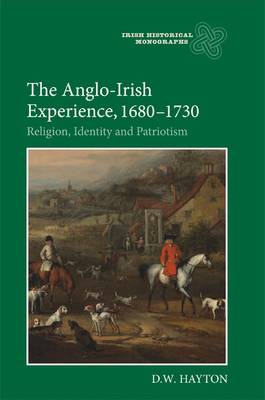
- Afhalen na 1 uur in een winkel met voorraad
- Gratis thuislevering in België vanaf € 30
- Ruim aanbod met 7 miljoen producten
- Afhalen na 1 uur in een winkel met voorraad
- Gratis thuislevering in België vanaf € 30
- Ruim aanbod met 7 miljoen producten
Zoeken
€ 177,45
+ 354 punten
Omschrijving
Outlines the complex nature of the Anglo-Irish ruling class, showing how its multi-faceted identity was formed and how it evolved. The wars and revolutions of seventeenth-century Ireland established in power a ruling class of Protestant landowners whose culture and connexions were traditionally English, but whose interests and political loyalties were increasingly Irish. At first unsure of their self-image and ambivalent in their loyalties, they gradually became more confident and developed a distinctive notion of 'Irishness'. The Anglo-Irish Experience explores the religious, intellectual and political culture of this new elite during a period of change and adjustment. D.W. Hayton traces both the shifting sense of national identity characteristic of the period and the changing stereotype of the Irish in English popular literature - which did much to push the 'Anglo-Irish' to embrace their Irish heritage. He also argues for the emergence of a pragmatic, constructive form of political 'patriotism', linked closely to the prevailing ideology of economic 'improvement' and underpinned by the influence of evangelical Protestantism.
A key feature of the book is the use made of case studies of individuals and families: the decay of the Ormond Butlers, undermined by debt and eventually driven into political exile; the rise and fall of the Brodricks, gentlemen lawyers with a strong provincial power-base; the political journey of the politician and political writer Henry Maxwell, from'commonwealth whig' ideologue to ministerial hack; and the relationship between Sir John Rawdon, a pious and intellectual squire, and his estate agent Thomas Prior, pamphleteer and apostle of 'improvement'. These and other narratives illustrate the variety and complexity of the 'Anglo-Irish' experience in a period that witnessed the foundation of what would in due course come to be known as the 'Protestant nation'. Early modern British and Irish historianswill find this book invaluable. D.W. Hayton is Professor of Early Modern Irish and British History at Queen's University Belfast, and the author of Ruling Ireland, 1685-1742: Politics, Politicians and Parties (Boydell, 2004)
A key feature of the book is the use made of case studies of individuals and families: the decay of the Ormond Butlers, undermined by debt and eventually driven into political exile; the rise and fall of the Brodricks, gentlemen lawyers with a strong provincial power-base; the political journey of the politician and political writer Henry Maxwell, from'commonwealth whig' ideologue to ministerial hack; and the relationship between Sir John Rawdon, a pious and intellectual squire, and his estate agent Thomas Prior, pamphleteer and apostle of 'improvement'. These and other narratives illustrate the variety and complexity of the 'Anglo-Irish' experience in a period that witnessed the foundation of what would in due course come to be known as the 'Protestant nation'. Early modern British and Irish historianswill find this book invaluable. D.W. Hayton is Professor of Early Modern Irish and British History at Queen's University Belfast, and the author of Ruling Ireland, 1685-1742: Politics, Politicians and Parties (Boydell, 2004)
Specificaties
Betrokkenen
- Auteur(s):
- Uitgeverij:
Inhoud
- Aantal bladzijden:
- 246
- Taal:
- Engels
- Reeks:
- Reeksnummer:
- nr. 9
Eigenschappen
- Productcode (EAN):
- 9781843837466
- Verschijningsdatum:
- 18/10/2012
- Uitvoering:
- Hardcover
- Formaat:
- Genaaid
- Afmetingen:
- 160 mm x 241 mm
- Gewicht:
- 539 g

Alleen bij Standaard Boekhandel
+ 354 punten op je klantenkaart van Standaard Boekhandel
Beoordelingen
We publiceren alleen reviews die voldoen aan de voorwaarden voor reviews. Bekijk onze voorwaarden voor reviews.











